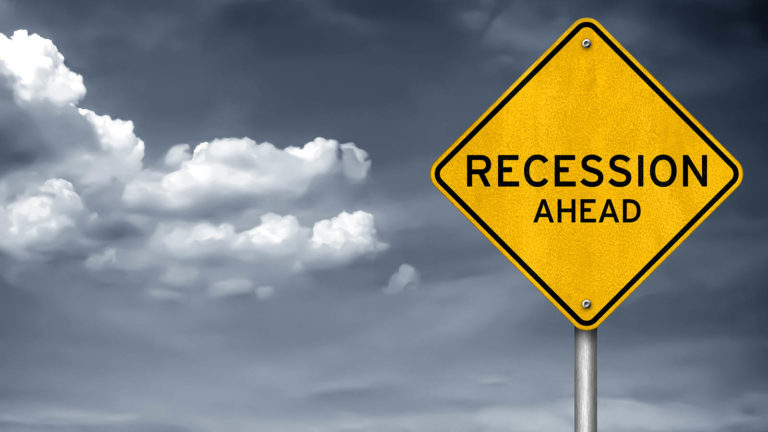The likelihood of a U.S. recession is a matter of perspective and seems to change over time.
Recession concerns have been growing due to rising interest rates and market uncertainty for most of the past year. Recently, sentiment shifted as investors increasingly considered the possibility of a soft landing, where the Federal Reserve raises rates to curb inflation without causing a recession. Yet, caution still prevails among many.
That said, there are some analysts who believe a recession is coming even sooner than that. In fact, they predict it could hit as early as 2024. We will talk more about the so-called recession and highlight sentiments from analysts.
Recent Recession News
In July, the Federal Reserve staff abandoned its earlier 2024 recession forecast, signaling a significant shift. However, the yield curve, measured by the 10-year and 3-month Treasury rates, still indicates a 61% chance of a recession within a year. Historically, that’s a reliable predictor using a New York Fed model spanning 1959 to 2009 data.
Economists are divided, with 48% forecasting a recession in the next year. But consumers are more cautious, with over 69% anticipating a recession in a Conference Board survey. In contrast, some corporate leaders are more optimistic, with Goldman Sachs (NYSE:GS) reducing its recession likelihood to 15%, while Bank of America (NYSE:BAC) estimated the likelihood to be between 35% and 40%. CEOs’ recession preparations dropped from 92% in the second quarter of 2023 to 84% for the next 12 to 18 months.
Additionally, household debt reached a record $17 trillion in March, surging 19% year-over-year, driven by rising interest rates that likely impacted household budgets. Corporate defaults increased in 2023 and are expected to continue. The economy exhibits mixed signals, making it uncertain whether a recession will occur in 2024. The complete impact of higher interest rates on consumers and businesses remains unknown.
Citi Research on Possible Recession
Citi Research analysts predicted a looming recession in early 2024. The report, based on unemployment rates and several other factors, suggests a potential downturn in just 10 months.
The research indicated that the U.S. wasn’t currently in a recession or on the brink of one. However, it noted that tightening credit conditions and rising real Treasury yields would slow the economy. Initially predicting a recession in the first half of 2024, recent strong growth indicators like job additions, CPI increase and robust retail sales shifted the forecast to the second quarter.
Despite these factors, the Federal Reserve might not raise rates due to higher 10-year yields. The Fed’s future actions are uncertain, with the possibility of additional hikes, possibly starting in December.
NABE’s Take on the Recession
According to a survey conducted from April 4 to April 12 by the National Association of Business Economics, 53% of economists at companies and trade groups saw the odds of a downturn in the next 12 months as 50% or less.
In contrast, 44% believed there was a better-than-even chance of a slump. That reflects a shift from NABE’s January survey, where 54% thought a recession within 12 months was probable.
An improved outlook for the economy appears linked to increased sales at businesses, particularly with 46% of economists reporting rising sales during Q1 2023, a positive shift from January when only 38% cited rising sales. Economists like Ken Simonson of the National Association of Business Economics likely view higher company revenue as an indicator of stronger overall economic growth.
Furthermore, he noted in April — “Inflation has eased, employment is still growing.” The supply chain issues that previously led to product shortages have also seen significant improvement. The surveyed businesses encompass NABE members, spanning manufacturers and service providers.
Bank of America Expects Inflation Can Hit Fed’s 2% Target
Additionally, Bank of America CEO Brian Moynihan predicted in June that U.S. inflation would align with the Fed’s 2% target by 2025, with Fed projections aiming for 2.1% by then.
According to Moynihan, consumers are already curbing spending to achieve 2% inflation, reflecting both positive and negative aspects. He expects the Fed to raise rates a “couple more times” in the current year to align with its target and maintain rates until May 2024, followed by a rate cut. Some traders anticipate a rate cut in March 2024, but Moynihan believes a mild recession is more likely to occur in the early part of the following year, contrary to his previous prediction.
Moynihan also predicted the unemployment rate wouldn’t exceed 5%, noting its peak during the pandemic-induced recession was 14.7% in April 2020 but returned to 3.5% by July 2022. The latest jobs report showed a rise to 3.7%, despite strong job growth.
He also emphasized that even those who retain their jobs could feel the impact due to credit tightening, as banks tend to be more selective in lending during economic downturns. Riskier borrowers might face loan denials or higher interest rates.
What To Do Now?
In recent years, economists have faced humbling challenges due to unexpected shocks like the pandemic and the Russia/Ukraine war, causing forecasting models to falter. While a soft landing is possible, it’s not the most probable outcome, given the confluence of factors. Those can be constant increases in oil prices, Fed rate hikes, student loan repayments, auto strikes and a global economic slowdown.
That said, this isn’t a call to abandon economic concerns or financial planning. A recession, even if mild, can still impact individuals and businesses. The important thing is to be watchful of market trends and keep an eye on essential economic indicators, as they may hint at potential changes in the economy.
On the date of publication, Chris MacDonald did not hold (either directly or indirectly) any positions in the securities mentioned in this article. The opinions expressed in this article are those of the writer, subject to the InvestorPlace.com Publishing Guidelines.

